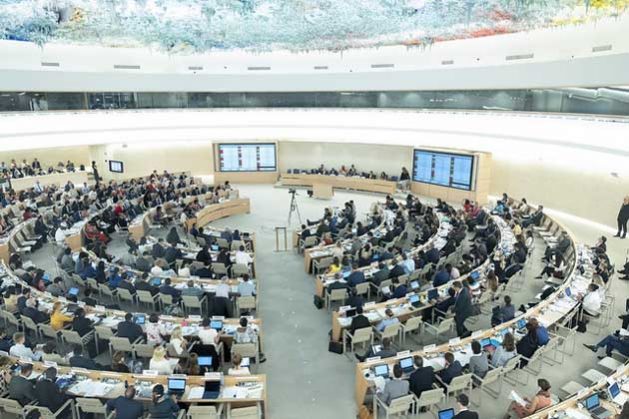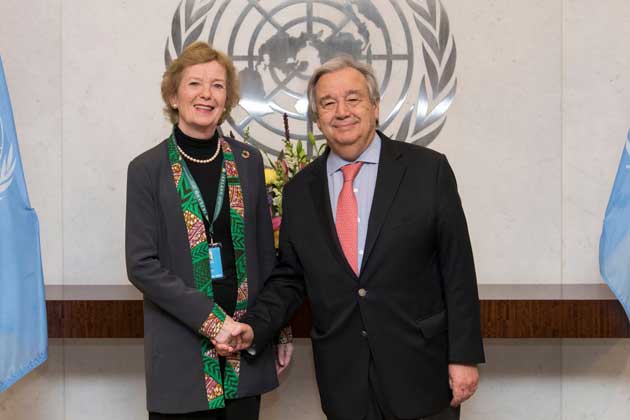When UN’s Cash Crisis Undermines Human Rights, Are the World’s Torturers the Key Beneficiaries?

UNITED NATIONS, Jan 24 (IPS) - The UN's ongoing cash crisis, which has virtually destabilized the Organization's day-to-day operations, has also undermined the human rights mandate of the Geneva-based Human Rights Council (HRC).
The HRC's programme of work has been hindered by dwindling resources resulting in shorter working hours, cancellation of meetings, reduction in staff and leaving some of the UN Special Envoys investigating human rights violations worldwide -- grounded.
The new austerity measures, prompted by a shortfall in assessed contributions from member states, came into force last October. But so far there are no signs of any significant improvement.
Kyle Ward, Director, a.i., Human Rights Council & Treaty Mechanisms Division, Office of the UN High Commissioner for Human Rights (OHCHR), told IPS that the human rights treaty bodies, established under the international human rights conventions, have been struggling with reductions in their overall regular budget resources, including a 25% reduction in travel resources for members (applied by the General Assembly in the last biennium), as well as reduced staffing, which has had already a serious impact on their ability to meet.
"Last year, with the financial crisis, it appeared that they would not be able to complete all of their sessions, until the UN Controller intervened and agreed to ensure we would have access to sufficient funds to enable them to meet".
It was a bit touch-and-go, said Ward, "but for the most part we managed."
But some of the work of the treaty bodies, he pointed out, was nevertheless blocked because of the shortfall in resources.
"The situation has unfortunately not improved this year, as the main budgetary constraints remain – while the potential impact of a continuing liquidity crisis for the Organization also remains a serious concern," he warned.

Dr. Simon Adams, Executive Director of the Global Centre for the Responsibility to Protect, told IPS the Human Rights Council and its mechanisms and the Geneva treaty bodies form an essential early warning system with regard to potential atrocity crimes.
"Starving the system of funds, and undermining its effectiveness, will only benefit those who prefer silence and inaction when it comes to human rights abuses and violations in the world today", he added.
Moreover, he pointed out, "weakening the Human Rights Council only benefits torturers, atrocity perpetrators and those who consider universal human rights to be an affront to the unrestrained exercise of state power."
Meanwhile, the Human Rights Council has been looking at efficiency measures for some time and had some success there, rearranging its schedule to be able to reduce the number of its annual meetings.
But this is now being threatened by the Department of General Assembly and Conference Management (DGACM) due to the "special measures" arising from the cash flow crisis, with the refusal to provide interpretation for any lunchtime meetings (which are essential – even in the reduced format – to enable the Council to cover its agenda in its ten allotted weeks per year).
The President of the Council, Ambassador Elisabeth Tichy-Fisslberger of Austria, has written to the Secretary-General to request that this be allowed notwithstanding – still waiting for an outcome, with the main annual session just a few weeks away.
Similarly, the restrictions have also led DGACM to restrict the interpretation services to the Universal Periodic Review (UPR) meetings beyond the two standard three-hour meetings per day, in order to save money.
The UPR has since the beginning allocated 3.5 hours to each State under review . . . so this will shave at minimum 15 minutes from each (given a 15-minute "courtesy" extension by the interpreters).
As this comes in the midst of the UPR Third cycle, there is some concern about equity in treatment to all States . . . but in reality, the statistics show that only 20% of the total have actually gone over 3h15 for their reviews, so the impact is not *that* extreme.
As it stands, in an effort to better manage cash flow, the Controller has decided (presumably in consultation with the SG) to allocate resources only on a quarterly basis (rather than the usual full allotment at the beginning of the year).
Although fully understandable, says one staffer, it also difficult to manage as the work is not simply linear . . . "so for a number of important mandates we cannot manage on just 25% right now."
The Commission of Inquiry on Syria is a case in point, as the current mandate is only through March – so they need 100% of their considerable 2020 resource requirements now.
Once again, the OHCHR will have to juggle resources and move allocations around in order to make this work as best it can, which is extremely inefficient and time-consuming.
"A more tailored approach to the situation would be unwieldy for the colleagues at UNHQ to manage across the entire Organization, but it certainly feels like those of us at the operational end are being made to bear the brunt of all the various "emergency" measures, making everything we are trying to accomplish even more difficult," said another staffer.
In her letter to Guterres last month, Ambassador Tichy-Fisslberger said "the United Nations Office at Geneva (UNOG) has informed me that due to the special emergency measures you instituted last October to address the United Nations' liquidity crisis, the meetings of intergovernmental bodies cannot be serviced outside of normal official hours"
It is furthermore of great concern that according to UNOG, they will be unable to service meetings of the upcoming 35th session of the Universal Periodic Review in accordance with Human Rights Council Decision 17/119 of 19 July 2011.
"When it established the Human Rights Council through resolution 60/251 of 15 March 2006, the General Assembly decided that the Human Rights Council should schedule no fewer than three sessions per year, for a total duration of no less than ten weeks," the letter said.
As its programme of work has grown over the past 13 years, the Human Rights Council has often been obliged to schedule more than two meetings per working day in order to complete its programme of work.
Consequently, a considerable number of lunchtime meetings have been required in recent years in order to deal with numerous thematic and country human rights crises.
"In 2016, the Director-General of UNOG and the Under-Secretary-General for General Assembly and Conference Management drew the attention of my predecessor to the growing dichotomy between the workload entailed in servicing the Council and the resources allocated to UNOG", the letter adds.
In her letter, Ambassador Tichy-Fisslberger also said: "In your address to the Human Rights Council on 25 February 2019, you emphasized that "the Human Rights Council is the epicentre for international dialogue and cooperation on the protection of all human rights."
In order for the Council to fulfil its responsibilities vis-àvis the international community and carry out all of its mandated activities, some lunchtime meetings are necessary.
Should the Human Rights Council not be afforded the opportunity to meet, as is required by its programme of work, it would be prevented from fulfilling its responsibilities under General Assembly Resolution 60/251, and the work of the United Nations in the area of human rights, and the human rights cause as a whole, would suffer as a result.
The writer can be contacted at [email protected]
© Inter Press Service (2020) — All Rights ReservedOriginal source: Inter Press Service
 Global Issues
Global Issues